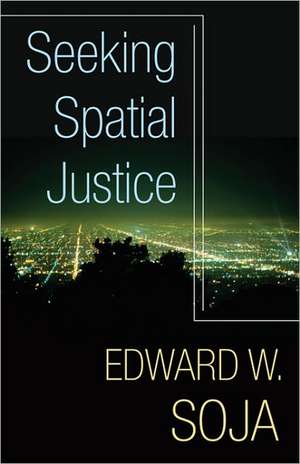Seeking Spatial Justice: Globalization and Community, cartea 16
Autor Edward W. Sojaen Limba Engleză Paperback – 26 mar 2010
In 1996, the Los Angeles Bus Riders Union, a grassroots advocacy organization, won a historic legal victory against the city’s Metropolitan Transit Authority. The resulting consent decree forced the MTA for a period of ten years to essentially reorient the mass transit system to better serve the city’s poorest residents. A stunning reversal of conventional governance and planning in urban America, which almost always favors wealthier residents, this decision is also, for renowned urban theorist Edward W. Soja, a concrete example of spatial justice in action.
In Seeking Spatial Justice, Soja argues that justice has a geography and that the equitable distribution of resources, services, and access is a basic human right. Building on current concerns in critical geography and the new spatial consciousness, Soja interweaves theory and practice, offering new ways of understanding and changing the unjust geographies in which we live. After tracing the evolution of spatial justice and the closely related notion of the right to the city in the influential work of Henri Lefebvre, David Harvey, and others, he demonstrates how these ideas are now being applied through a series of case studies in Los Angeles, the city at the forefront of this movement. Soja focuses on such innovative labor–community coalitions as Justice for Janitors, the Los Angeles Alliance for a New Economy, and the Right to the City Alliance; on struggles for rent control and environmental justice; and on the role that faculty and students in the UCLA Department of Urban Planning have played in both developing the theory of spatial justice and putting it into practice.
Effectively locating spatial justice as a theoretical concept, a mode of empirical analysis, and a strategy for social and political action, this book makes a significant contribution to the contemporary debates about justice, space, and the city.
Din seria Globalization and Community
-
 Preț: 177.59 lei
Preț: 177.59 lei -
 Preț: 215.01 lei
Preț: 215.01 lei -
 Preț: 216.38 lei
Preț: 216.38 lei -
 Preț: 247.93 lei
Preț: 247.93 lei -
 Preț: 200.29 lei
Preț: 200.29 lei -
 Preț: 218.74 lei
Preț: 218.74 lei -
 Preț: 221.03 lei
Preț: 221.03 lei - 25%
 Preț: 127.67 lei
Preț: 127.67 lei - 27%
 Preț: 123.49 lei
Preț: 123.49 lei -
 Preț: 213.65 lei
Preț: 213.65 lei -
 Preț: 256.58 lei
Preț: 256.58 lei - 19%
 Preț: 132.08 lei
Preț: 132.08 lei - 21%
 Preț: 135.20 lei
Preț: 135.20 lei - 27%
 Preț: 123.49 lei
Preț: 123.49 lei - 25%
 Preț: 126.61 lei
Preț: 126.61 lei - 26%
 Preț: 125.98 lei
Preț: 125.98 lei - 17%
 Preț: 141.65 lei
Preț: 141.65 lei - 18%
 Preț: 155.64 lei
Preț: 155.64 lei - 13%
 Preț: 149.55 lei
Preț: 149.55 lei - 14%
 Preț: 140.42 lei
Preț: 140.42 lei - 18%
 Preț: 153.44 lei
Preț: 153.44 lei - 10%
 Preț: 683.89 lei
Preț: 683.89 lei -
 Preț: 227.97 lei
Preț: 227.97 lei - 17%
 Preț: 141.65 lei
Preț: 141.65 lei - 26%
 Preț: 125.72 lei
Preț: 125.72 lei - 25%
 Preț: 174.02 lei
Preț: 174.02 lei - 25%
 Preț: 140.06 lei
Preț: 140.06 lei
Preț: 154.88 lei
Nou
Puncte Express: 232
Preț estimativ în valută:
29.64€ • 30.86$ • 25.05£
29.64€ • 30.86$ • 25.05£
Carte disponibilă
Livrare economică 17 februarie-03 martie
Livrare express 31 ianuarie-06 februarie pentru 22.87 lei
Preluare comenzi: 021 569.72.76
Specificații
ISBN-13: 9780816666683
ISBN-10: 0816666687
Pagini: 288
Dimensiuni: 140 x 216 x 18 mm
Greutate: 0.31 kg
Ediția:1
Editura: University of Minnesota Press
Colecția Univ Of Minnesota Press
Seria Globalization and Community
ISBN-10: 0816666687
Pagini: 288
Dimensiuni: 140 x 216 x 18 mm
Greutate: 0.31 kg
Ediția:1
Editura: University of Minnesota Press
Colecția Univ Of Minnesota Press
Seria Globalization and Community
Notă biografică
Edward W. Soja is Distinguished Professor of Urban Planning at the UCLA School of Public Affairs, and for many years was Centennial Visiting Professor in the Cities Programme, London School of Economics. He is the author of Postmodern Geographies: The Reassertion of Space in Critical Theory, Thirdspace: Journeys to Los Angeles and Other Real-and-Imagined Places, and Postmetropolis: Critical Studies of Cities and Regions.
Cuprins
Prologue, Introduction, 1. Why Spatial? Why Justice? Why L.A.? Why Now?, 2. On the Production of Unjust Geographies, 3. Building a Spatial Theory of Justice, 4. Seeking Spatial Justice in Los Angeles, 5. Translating Theory into Practice: Urban Planning at UCLA, 6. Seeking Spatial Justice after 9/11: Continuities and Conclusions, Acknowledgments, Notes and References, Index
